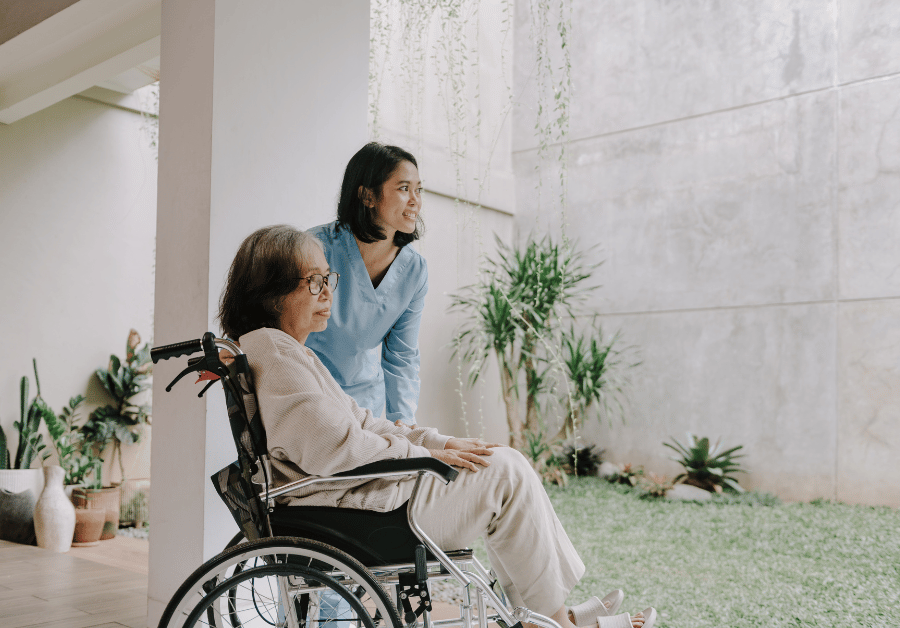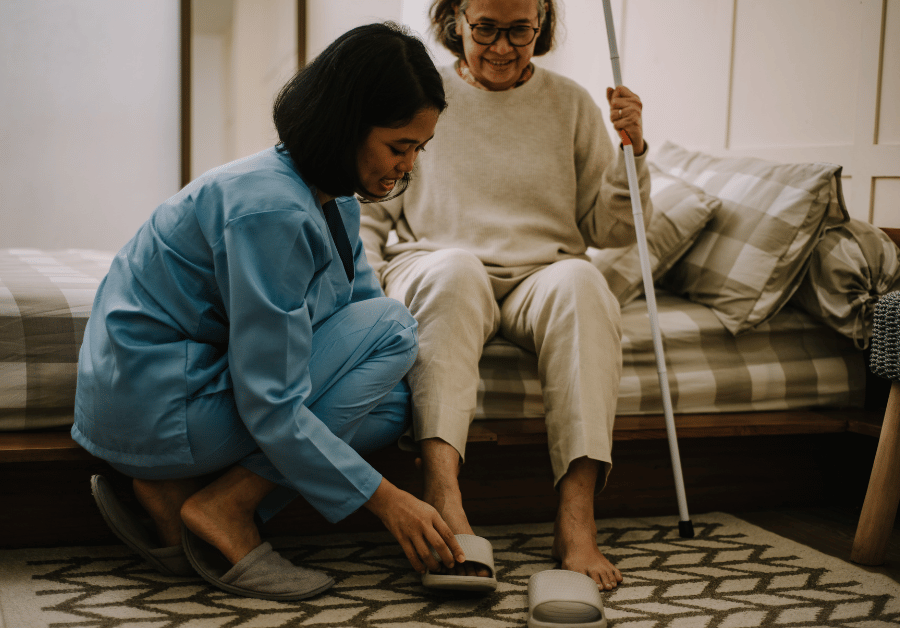Government Subsidised Respite Care: Your Essential Guide in Australia
Government Subsidised Respite Care: Your Essential Guide in Australia
Caring for a loved one is a profound act of love and dedication, but it can also be incredibly demanding. Every carer, whether for an older Australian, a person with disability, or someone with specific health needs like dementia, eventually needs a break. This is where government subsidised respite care steps in. In Australia, the government plays a crucial role in funding short-term care options, providing essential relief for carers and ensuring continued high-quality support for care recipients. Understanding how to access this vital assistance can make a significant difference to the well-being of both carers and those they support.
At Alliance Care Support, we understand the challenges and rewards of the caring role. We are dedicated to empowering individuals and their families by providing tailored care, support, and resources, including navigating the complexities of government subsidised respite care. Our mission is to help clients achieve their personal goals while receiving compassionate care, enabling them to lead fulfilling lives in a supportive community across Australia, from Sydney to Perth, Melbourne, Brisbane, Adelaide, and Hobart.
Why is Respite Care So Important for Australians?

Respite care, fundamentally, is about providing a temporary break from the daily demands of caring. This break is not just a luxury; it's a necessity for the long-term sustainability of the caring relationship and the well-being of everyone involved. The benefits of accessing respite care are extensive and multifaceted:
For Carers: Preventing Burnout and Recharging
- Mental and Emotional Well-being: Caring can lead to significant stress, anxiety, and isolation. Respite provides an opportunity to de-stress, focus on personal needs, and connect with others.
- Physical Health: The physical demands of caring can be exhausting. A break allows carers to rest, attend to their own health appointments, or simply engage in physical activities they enjoy.
- Maintaining Relationships: Time away from caring responsibilities can allow carers to nurture other relationships, whether with partners, children, or friends, which are often neglected due to time constraints.
- Personal Growth and Hobbies: Respite offers a chance to pursue hobbies, engage in personal development, or simply have quiet time for reflection, all of which contribute to a richer life outside of the caring role.
- Sustaining the Caring Role: Ultimately, regular breaks help prevent carer burnout, making the caring role more sustainable and enjoyable in the long run. Without adequate support, many carers find themselves overwhelmed, which can impact the quality of care they can provide.
For Care Recipients: A Change of Scenery and Continued Support
- New Experiences: Respite can offer care recipients new social interactions, activities, and environments, enriching their lives.
- Professional Care: During residential respite, care recipients benefit from 24/7 professional support, often including access to a wider range of allied health services.
- Maintained Routines: Quality respite providers strive to maintain the care recipient's routines and preferences, ensuring a smooth transition and consistent care.
- Social Engagement: Particularly in group settings, respite can foster new friendships and reduce feelings of isolation.
- Enhanced Well-being: A change of pace and new interactions can boost the care recipient's mood and overall well-being.
The Australian Government recognises these profound benefits, which is why they provide significant subsidies to make respite care accessible to those who need it most.
Types of Government Subsidised Respite Care Available
Government subsidised respite care comes in various forms, designed to meet diverse needs and preferences. Understanding these options is key to choosing the right support for your situation:
Residential Respite Care
This is perhaps the most well-known form of respite care, where the care recipient stays temporarily in an approved residential aged care facility. It's ideal for carers needing a longer break, such as for a holiday, or for care recipients who require a higher level of supervision or clinical care. The Australian Government pays a subsidy to the aged care providers for each person in residential respite care, significantly reducing the cost for families. These facilities offer a safe, supervised environment with meals, personal care, and often recreational activities. For older Australians, this is typically accessed through My Aged Care.
In-Home Respite Care
In-home care allows the care recipient to remain in their familiar surroundings while a professional support worker comes to their home to provide care. This can range from a few hours a day to overnight stays. It's an excellent option for those who prefer to stay at home and for carers who need a short break or assistance with specific tasks. Services can include personal care, meal preparation, medication management, and companionship. Alliance Care Support specialises in providing compassionate and tailored in-home care that can serve as a form of respite, ensuring continuity and comfort for the individual.
Community Respite Care (Centre-Based Day Respite)
These services provide planned activities and social engagement in a community setting, such as a day centre. Care recipients attend for a few hours or a full day, allowing carers to attend appointments, run errands, or simply have some personal time. These programs often include transport, meals, and a range of recreational and therapeutic activities designed to stimulate and engage participants. This type of respite care can be particularly beneficial for social interaction and maintaining cognitive function.
Emergency Respite Care
Life can be unpredictable. When unforeseen circumstances arise, such as a carer's sudden illness, accident, or an urgent family matter, emergency respite care becomes critical. This type of respite care provides immediate, short-term support to ensure the care recipient is safe and cared for. The Carer Gateway is a key resource for accessing emergency respite care in your home or community, offering support and connections to services when you need emergency assistance quickly.
Each type of respite care offers unique benefits, and the best choice depends on the specific needs of the care recipient and the carer. Alliance Care Support can help you understand and access the most suitable option, including their own NDIS-approved Supported Independent Living (SIL) homes which can provide a residential-like respite experience for people with disability.
Eligibility for Government Subsidised Respite Care in Australia

Accessing government subsidised respite care depends on the care recipient's age, specific needs, and the assessment process relevant to their situation. The primary pathways for accessing this support are:
My Aged Care (for older Australians)
For Australians aged 65 years and over (or 50 years and over for Aboriginal and Torres Strait Islander people), access to subsidised respite care is primarily through My Aged Care. The first step is to contact My Aged Care to arrange an assessment. This assessment is typically conducted by an Aged Care Assessment Team (ACAT) or, for less complex needs, a Regional Assessment Service (RAS). The ACAT assessment will determine the level of care and support required, including eligibility for residential respite or other forms of short-term care. They will assess the care recipient's functional abilities, health status, and social circumstances to recommend appropriate services. Once approved, you can then seek an approved residential aged care provider or other service providers.
National Disability Insurance Scheme (NDIS)
For people with disability, respite care (often referred to as 'short-term accommodation' or 'STA') is funded through the National Disability Insurance Scheme (NDIS). If the care recipient is an NDIS participant, their plan may include funding for STA, which covers short stays away from home. This can be in a dedicated respite facility, a supported independent living (SIL) home like those offered by Alliance Care Support, or other suitable arrangements. The NDIS focuses on providing 'reasonable and necessary' supports that help participants achieve their goals and increase their independence, while also providing crucial breaks for their carers. It's important to discuss respite care needs during NDIS planning meetings to ensure it is adequately funded in the participant's plan.
Department of Veterans' Affairs (DVA)
Eligible veterans and war widows/widowers may access respite care through the Department of Veterans' Affairs (DVA). DVA offers various programs, including Veterans' Home Care (VHC) and specific residential care arrangements, that can include respite services. Veterans' Home Care provides a range of in-home services designed to assist veterans to remain living independently in their homes, and this can encompass support for carers through respite. For specific details on eligibility and how to apply for DVA-funded respite care, veterans or their families should contact the DVA directly.
Carer Gateway
While not a direct funding body for long-term care, the Carer Gateway is an invaluable national service that provides practical and emotional support for carers, including access to short-term and emergency respite care. They can help connect carers with local service providers and offer counselling, peer support, and coaching. If you need emergency respite, the Carer Gateway on 1800 422 737 is often the first point of contact.
Understanding which pathway applies to your situation is the first step. Alliance Care Support can assist families in navigating these different government programs and linking them to the most appropriate care services for their individual needs.
Navigating the Application Process: How to Access Your Subsidised Respite
Once you understand the eligibility criteria, the next step is the application process. While it can seem daunting, breaking it down into manageable steps can make it easier to access the subsidised respite care you need.
Initial Contact and Assessment
- For Aged Care: Call My Aged Care on 1800 200 422 or visit their website. They will guide you through an initial screening and then arrange an ACAT (Aged Care Assessment Team) assessment for comprehensive needs evaluation, particularly for residential respite. The ACAT will assess the care recipient's needs and determine their eligibility for various aged care services, including short-term care.
- For Disability (NDIS): If the care recipient is already an NDIS participant, discuss respite care (Short-Term Accommodation) with their Local Area Coordinator (LAC) or planner during plan reviews or by requesting a plan variation. Ensure that the need for carer breaks and participant's goals related to short-term accommodation are clearly articulated. If not yet an NDIS participant, the first step is to apply for NDIS access.
- For Veterans: Contact the Department of Veterans' Affairs (DVA) directly for information on their specific respite care programs and eligibility criteria.
- For Emergency Needs: For urgent situations, contact the Carer Gateway on 1800 422 737 immediately. They can provide immediate assistance and connect you to local emergency respite care services.
Understanding Your Allocation of Days
For My Aged Care, eligible persons can access up to 63 days of subsidised respite care per financial year (which resets on 1 July each year). It's crucial to keep track of these days. For NDIS, funding for Short-Term Accommodation will be specified in the participant's plan, often as a fixed amount or number of days.
Finding and Choosing a Provider
Once you have an approval or funding, you can start looking for an appropriate respite care provider. My Aged Care provides a service finder tool, and the NDIS portal lists registered providers. It's recommended to research and compare providers. Consider factors like:
- The type of respite care offered (residential, in-home, community).
- The provider's experience and specialisation (e.g., dementia care, disability support).
- The qualifications and compassion of their staff.
- The facilities and activities available (for residential or community-based respite).
- Location (e.g., proximity to family, familiar environment).
Alliance Care Support is an NDIS-approved provider with a strong focus on person-centred care, offering tailored respite care services including Supported Independent Living (SIL) options that can function as a comfortable and accessible respite environment. We encourage you to reach out to us to discuss how our services can meet your needs.
Arranging and Utilising Care
Once you've chosen a provider, you'll work with them to arrange the specific dates and details of the respite care. This includes discussing the care recipient's routine, preferences, medications, and any specific support needs. Effective communication with the provider ensures a smooth and beneficial respite care period for everyone involved.
The 63-Day Allocation: What You Need to Know About Subsidised Respite Days

One of the most common questions surrounding government subsidised respite care, particularly for older Australians under My Aged Care, revolves around the allocation of days. The Australian Government will fund up to 63 days of subsidised respite care per eligible person per financial year. This 63-day allocation resets on 1 July each year, regardless of when you started using your days.
It's important to understand that these 63 days are a maximum. You don't have to use all of them, and you can use them flexibly. For example, you might use them for:
- Several short stays (e.g., a few days or a week at a time) throughout the financial year.
- One longer stay, up to the 63-day limit.
- A combination of both, depending on your needs and the availability of care providers.
Extending Your Respite Days
In some situations, a care recipient may need more than the standard 63 days of subsidised respite care per year. If this is the case, an application for an extension can be made. This application usually needs to be submitted to an ACAT (Aged Care Assessment Team) for their assessment and approval. Extensions are typically granted for exceptional circumstances, such as:
- A carer's prolonged illness or hospitalisation.
- Unforeseen family emergencies.
- Significant changes in the care recipient's condition requiring more intensive short-term support.
It's crucial to plan ahead and discuss any potential need for extensions with your ACAT assessor or chosen respite care provider as early as possible. While the 63 days offer substantial support, knowing the process for extensions ensures that you and your loved one can continue to receive the necessary care periods without interruption.
Understanding the Costs: What Does Government Subsidised Respite Care Cover?
While the term 'subsidised' implies that the government covers a significant portion of the cost, it's important for families to understand what they might still be expected to contribute. The structure of costs varies slightly depending on whether the respite care is accessed through My Aged Care or the NDIS.
My Aged Care (Residential Respite)
For residential respite care under My Aged Care, the Australian Government pays a subsidy directly to the approved residential aged care providers. This subsidy covers the cost of care services. However, care recipients are generally expected to pay a daily fee, which is a contribution towards their living costs, such as:
- Accommodation
- Meals
- Laundry
- Utilities
This daily fee is set by the government and is typically a percentage of the single basic age pension (currently 85%). It is a standard fee that applies to all residents, regardless of their income or assets. There are no income or assets tests for residential respite care daily fees, unlike for permanent residential aged care.
It's essential to confirm the exact daily fee with the residential aged care facility before the respite care period begins. There may also be additional costs for optional services, such as hairdressing or specific outings, which are not covered by the government subsidy or the daily fee.
National Disability Insurance Scheme (NDIS)
For NDIS participants, the cost of respite care (Short-Term Accommodation) is typically included in their NDIS plan. The NDIS funds the support component of the stay, which covers the personal care, supervision, and activities. Participants are generally expected to pay for their usual living costs, such as food and utilities, out of their own money. However, the NDIS funding for STA is designed to cover the 'hotel' type costs, including accommodation, food, and activities, for up to 28 days per year. It's crucial for participants and their families to understand how STA funding is allocated in their specific plan and what it covers to avoid unexpected out-of-pocket expenses. Alliance Care Support, as an NDIS-approved provider, can offer clear guidance on how your NDIS plan can be utilised for their respite care services.
Department of Veterans' Affairs (DVA)
For eligible veterans, the DVA may cover the full cost of approved respite care services, depending on the specific program and individual circumstances. It's always best to confirm the details of coverage directly with the DVA.
In all cases, transparency about costs is vital. Don't hesitate to ask prospective care providers for a detailed breakdown of fees and what is included in the subsidised respite care package. This ensures there are no surprises and you can budget accordingly for the vital breaks you or your loved one needs.
Finding the Right Provider for Your Government Subsidised Respite Care

Choosing the right respite care provider is just as important as understanding how to access the subsidy. A good provider will not only meet the care recipient's needs but also offer peace of mind to the carer. Here's what to look for when selecting an approved residential aged care facility or an in-home care provider for government subsidised respite care:
Accreditation and Approval
Ensure the provider is accredited and approved by the relevant government bodies (e.g., Aged Care Quality and Safety Commission for aged care, NDIS Quality and Safeguards Commission for disability services). This confirms they meet national standards for quality and safety. For residential aged care services, look for providers that receive public sector residential aged care services funding or are otherwise government-approved.
Expertise and Specialisation
Consider if the provider has experience with the specific needs of the care recipient, such as dementia care, complex medical conditions, or behavioural support for children with disability, autism or ADHD. Specialised knowledge ensures that the care provided is appropriate and effective.
Staff Qualifications and Compassion
Inquire about the qualifications and training of the staff. Are they registered nurses, qualified care workers, or allied health professionals? More importantly, observe their approach. Are they compassionate, respectful, and genuinely engaged with the care recipients? A warm and caring environment is paramount.
Environment and Facilities (for Residential Respite)
If considering residential respite, visit the facility if possible. Assess the cleanliness, safety, and overall atmosphere. Are the rooms comfortable and accessible? Are there communal areas for socialisation and activities? Does it feel like a welcoming home away from home?
Activities and Engagement
A good respite care program offers a range of stimulating activities tailored to the interests and abilities of the care recipients. This could include social outings, crafts, music, gentle exercise, or cognitive games. Engagement is crucial for well-being during a respite care period.
Communication and Flexibility
How well does the provider communicate with families? Are they responsive to inquiries and open to feedback? Do they offer flexibility in booking respite days to accommodate your schedule and needs?
At Alliance Care Support, we pride ourselves on being a trusted partner for government subsidised respite care across Australia. Our NDIS-approved homes are specifically designed with accessibility features, ensuring safety and comfort. We are committed to providing person-centred care that empowers individuals with disabilities, focusing on fostering independence and enhancing quality of life. Whether it’s through our Supported Independent Living (SIL) options that double as valuable respite, or our dedicated in-home care services, our compassionate team ensures every individual receives the highest standard of support. We encourage families to visit our facilities or discuss our in-home capabilities to see how we can provide a supportive and enriching respite experience in cities like Sydney, Melbourne, Brisbane, Adelaide, Perth, and Hobart.
Specific Considerations for Respite Care

While the general principles of government subsidised respite care apply broadly, certain conditions or demographics require tailored approaches and specific considerations.
Respite Care for Dementia
Caring for someone with dementia presents unique challenges, often requiring specialised understanding and patience. When seeking respite care for a person with dementia, it's crucial to find providers who:
- Have staff specifically trained in dementia care, including managing behavioural changes and communication strategies.
- Offer a secure and safe environment to prevent wandering, with clear signage and familiar sensory cues.
- Provide structured routines and engaging activities that are appropriate for cognitive impairment, helping to reduce anxiety and promote well-being.
- Focus on maintaining dignity and personhood, treating each individual with respect and understanding their unique history.
Many residential aged care facilities have dedicated dementia wings or programs, offering peace of mind that your loved one will receive expert care in a supportive setting during their respite care period.
Respite Care for Children with Disability, Autism, or ADHD
Parents and guardians of children with additional needs also require crucial breaks. Respite care for your child with disability, autism or ADHD is often accessed through the NDIS. Key considerations include:
- Specialised Programs: Look for providers who offer programs specifically designed for children with disability, incorporating therapeutic activities and developmental goals. The Australian Government's Inclusion Support Program also assists services to better include children with additional needs.
- Trained Staff: Ensure staff have experience and training in supporting children with diverse needs, including positive behaviour support and understanding sensory sensitivities.
- Safe and Stimulating Environments: The environment should be safe, engaging, and provide opportunities for play, learning, and social interaction tailored to the child's abilities.
- Continuity of Care: Discuss the child's routine, preferences, and any specific communication needs to ensure a smooth and comfortable transition during the respite care period.
Alliance Care Support provides services that can facilitate respite care for individuals with disability, including children, through their NDIS-approved services. Their focus on tailored support in NDIS-approved homes ensures a supportive and enriching experience.
Respite Care for Veterans
The Department of Veterans' Affairs (DVA) provides specific programs to support veterans and their carers, recognising their unique contributions and needs. DVA respite care can include:
- In-Home Respite: Services provided in the veteran's home.
- Residential Respite: Short-term stays in an Australian Government-funded aged care facility.
- Emergency Short-Term Respite: For urgent, unplanned situations.
Veterans and their families should contact the DVA directly to understand their eligibility and the specific types of respite care and support available to them. The DVA's aim is to support the health and well-being of veterans, and respite care is a key component of this.
Emergency Respite Care: When You Need Immediate Support
As mentioned earlier, emergency respite care is a critical safety net. Whether it's a sudden illness of the carer, an accident, or an unexpected family crisis, knowing who to call can provide immediate relief. The Carer Gateway (1800 422 737) is the primary national service for connecting carers to emergency respite care services, available 24/7. They can help arrange support in the home or in a community setting, ensuring the care recipient is safe and cared for while the carer addresses the emergency. It's wise to have this number readily accessible.
Alliance Care Support: Your Partner in Government Subsidised Respite Care
Ready for a Well-Deserved Break?
Contact Us TodayAt Alliance Care Support, we are deeply committed to empowering individuals with disabilities and supporting their dedicated carers across Australia. Our understanding of the profound impact that quality respite care can have drives our comprehensive approach to service delivery. We believe that everyone deserves the opportunity to live a fulfilling and independent life, and that carers deserve the essential breaks needed to sustain their invaluable role.
We specialise in providing tailored care, support, and resources, with a strong focus on Supported Independent Living (SIL), in-home care, and our flexible respite services. Our NDIS-approved homes, located in various accessible communities across major Australian cities like Sydney, Melbourne, Brisbane, Adelaide, Perth, and Hobart, are equipped with modern accessibility features. These homes are designed to ensure safety, comfort, and an enriching environment for participants, making them ideal settings for short-term accommodation or residential-style respite care.
Our mission extends beyond just providing services; it's about creating environments that foster genuine independence and enhance the overall quality of life for our clients. We work closely with individuals and their families to understand their unique goals and preferences, developing personalised care plans that truly make a difference. Our compassionate and highly trained team is dedicated to delivering care that is not only professional but also respectful, engaging, and aligned with each person's aspirations.
Whether you are seeking to understand your eligibility for government subsidised respite care, need assistance navigating the NDIS, or are looking for a trusted provider that prioritises independence and well-being, Alliance Care Support is here to guide you. We aim to simplify the process, offering clear information and practical solutions so that you can access the vital support you need without unnecessary stress. Our commitment is to enable our clients to lead fulfilling lives within a supportive community, knowing they have a reliable partner in their care journey.
Residential Respite Care – Temporary stays in aged care facilities.
In-Home Respite Care – Support workers come to the care recipient’s home.
Community (Centre-Based) Respite – Day programs offering social engagement and activities.
Emergency Respite Care – Immediate care during crises, accessed via the Carer Gateway.
Older Australians: Start with an assessment through My Aged Care.
People with Disability: Use your NDIS plan or apply to NDIS.
Veterans: Contact the Department of Veterans' Affairs.
For urgent needs, call the Carer Gateway at 1800 422 737.
My Aged Care: Up to 63 days per financial year, with possible extensions.
NDIS: Respite (Short-Term Accommodation) is funded according to the participant’s plan.
DVA: Varies based on eligibility and program type.
Conclusion: Embracing Support Through Government Subsidised Respite Care
Government subsidised respite care is a cornerstone of Australia's social support system, providing invaluable relief to carers and ensuring continuous, high-quality support for care recipients. From short-term residential stays to in-home assistance and emergency provisions, a range of options exists to suit diverse needs, whether for older Australians, people with disability, or veterans.
Navigating the various pathways – My Aged Care, the NDIS, or the DVA – requires understanding and patience, but the benefits of accessing these services are immeasurable. Taking a break is not a sign of weakness; it's a strategic and essential step towards maintaining your own well-being and ensuring you can continue your caring role effectively and sustainably. The Australian Government's commitment to funding these services reflects the recognition of the vital role carers play in our community.
Remember, you don't have to carry the burden alone. Support is available, and organisations like Alliance Care Support are here to help you access it. By understanding your options and connecting with the right providers, you can ensure that both you and your loved one receive the care and support needed to thrive.
Ready to explore your options for government subsidised respite care or discuss how Alliance Care Support can tailor a plan for you or your loved one? We're here to help you navigate the process and find the perfect solution. Contact us today to learn more about our compassionate and empowering care services.
Visit Alliance Care Support Today
